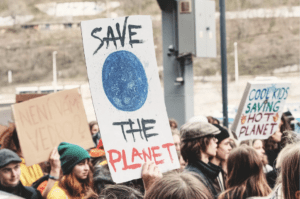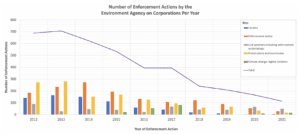Over the last decade UK Conservative governments have attacked vital environmental protections and regulations. From laying a bill before parliament earlier this month to scrap 570 EU environment laws retained after the UK left the EU, to a declining environment protections grant by the Department for Environment, Food and Rural Affairs (‘DEFRA’), the Conservative officials have shown a disregard to the environment.

In the annual budget provided by DEFRA to the Environment Agency, environmental protection grants have taken a beating. These grants help improve biodiversity, water and air pollution and quality, and regulate better. Therefore, these grants are an important part of the Environment Agency’s ability to function at their best for the environment. However, the 2020/2021 environment protection grant by DEFRA to the Environment Agency was 43% lower than in 2011/2012. But if inflation is considered, then in real terms the Environment Agency have half the amount to spend on environmental protection than they did a decade ago. This has created the perfect environment for corporations to continue breaching environmental laws and regulations with impunity.
But the question is, how have these actions impacted enforcement actions by the Environment Agency?
Violation Tracker Data: The declining enforcement of the Environment Agency
The data from Violation Tracker UK demonstrates a clear decline in the overall number of enforcement actions since 2012 by the Environment Agency against corporations. This data examines civil sanctions, such as enforcement undertakings, where a corporation agrees with the regulator to make improvements and in return the Environment Agency agree not to prosecute. The data also examines criminal sanctions such as enforcement notices and prosecutions.

Overall, there has been a 6-fold decline in enforcement actions taken by the Environment Agency against corporations since 2012. In other words, there were 6 times more enforcement actions a decade ago. Within this figure, prosecutions have declined even more rapidly. In 2012 there were 16 times the number of prosecutions against corporations than there were in 2021. But just as interesting is the growing use of civil sanctions, which although the use of these has fallen, they have fallen less sharply and are now used more often than prosecutions. They have only seen a 2-fold decline, which is comparably better than prosecutions.
This smaller decline may, in part, be due to the 2016 amendment to the Environment Permitting (England and Wales) Regulations (‘EPR’). This amendment significantly widened the scope of enforcement undertakings. This type of enforcement action is reflective of the ‘modern regulation’ agenda favoured by the Environment Agency in their 2006 report, with the offender seen as being trusted enough to negotiate and offer their proposals for correcting their wrongdoings. Enforcement undertakings, if satisfactorily completed, means the offender avoids formal prosecution for the offence.
Moreover, out of these 4074 enforcement actions carried out by the Environment Agency between 2012 and 2021, 41% received some form of monetary fine, whilst 59% did not receive any fine.
The Environmental Legacy of the Conservative Era
The data shows that during the last 10 years, there has been a staggering 84% decline in enforcement actions by the Environment Agency. Furthermore, it also shows that most actions (59%) do not receive any form of monetary penalty. The policies and real time budget cuts supported and put forward by the Conservatives over the last 12 years of their premiership have systematically impacted environmental regulation, quashing many of the powers the Environment Agency had, and this can be seen in the data.
It would be remiss to solely blame whomever the next PM is, or indeed the recent former PM Lis Truss for her own controversial environmental policies which, if she’d had her way, would have seen an increase in oil and gas extraction and a lift on the fracking ban. These policies are merely a symbol of a government who have always placed greater emphasis on the economy than on the environment. The Conservative government are fast becoming the government of climate deniers if they haven’t already.
The reality is that we are at a climate and environmental precipice: failure to act now means that we risk the future of the planet. The next UK PM needs to prioritise environmental and climate issues. We need the Environment Agency to be able to regulate effectively. This data has shown that in their current form, the Environment Agency are becoming nothing more than a symbolic regulator without much bite. The decline in the data speaks for itself; action is needed to restrengthen the Environment Agency’s muscles.